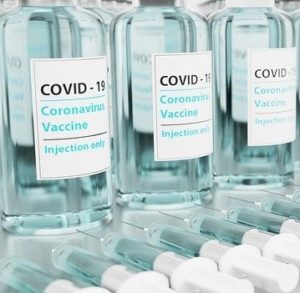Impact of the Delta Variant on Transmission, Vaccine, and Treatment Efficacy
Impact of the Delta Variant on Transmission, Vaccine, and Treatment Efficacy
June 21, 2021
One of the consequences of unchecked SARS-CoV-2 infections is the generation of mutations that have the potential to increase infectivity and transmissibility, confer a degree of resistance to vaccines, neutralizing antibodies, and monoclonal antibody therapy, and in some cases generate false negatives in RT-PCR tests. We have discussed some of these variants in previous Perspectives. The variant du jour is the Delta variant (B.1.617 lineage) that has arisen in India and contains a suite of 13 characteristic mutations. Questions about the new variant are similar to those arising from the appearance of the earlier variants. Is it more infectious? More lethal? Is it better able to infect people who have been vaccinated or previously infected? And will it be necessary at some point for vaccinated people to get booster shots? If so, when?
 Transmissibility
Transmissibility
Evidence for enhanced rate of transmissibility is now very much substantiated. The second wave of infections in India spread faster than did the first wave(1), but it is not clear what is the contribution of the variant due to the limited genomic sequencing analysis. However, the variant has become the dominant virus across India and has spread to other nations globally. In the UK, the Delta variant is quickly becoming the dominant strain in the UK by outpacing the Alpha variant. Wide spread of this variant would cause a third wave of COVID-19 in the UK. Now, this variant accounts for more than 6% of all infections in the US. A modeling study predicts that there is a “realistic possibility” that the Delta variant is 50% more transmissible than the Alpha variant. The Delta variant contains several mutations that are associated with enhanced transmissibility (2). Specifically, the key mutations are L452R (also present in the Epsilon variant) and E484Q (also present in the Beta and Gamma variants).
Pathogenicity
Is it more pathogenic than other variants? In an experimental infection study in hamsters(3), the Delta variant was more pathogenic, as judged by weight loss and the severity of lung lesions, compared to the B.1 D614G variant that appeared early in the pandemic and became dominant in 2020. Yet, caution must be taken, however, in extrapolating data on pathogenicity from hamsters to humans; in fact one can conclude at this stage that there is no evidence for increased severity of Delta variant-associated COVID-19.
 Vaccines and the Delta Variant
Vaccines and the Delta Variant
What about the ability of the Delta variant to infect people who are vaccinated or have recovered from a previous infection? Use of a live virus assay showed that the Delta variant is 6.8-fold more resistant to neutralization by sera from COVID-19 convalescent and Moderna- and Pfizer-vaccinated individuals. Despite this, a majority of the sera from convalescent individuals and all sera from vaccinated individuals were still able to neutralize the Delta variant. In the U.K. trial, efficacy of 2-dose Pfizer vaccine against this variant was 87.9% (93.4% against the Alpha variant); 2-dose AstraZeneca showed 59.8% efficacy against this variant and 66.1% against the Alpha variant (4). Similarly, a study that looked at convalescent sera or sera from those vaccinated with BBV152 (Covaxin, an inactivated whole virus vaccine) showed close neutralization titers between the Alpha and Delta variants (5). These studies suggest that the vaccines largely retain their efficacy against the variant.
A modeling study predicts that there is a “realistic possibility” that the Delta variant is 50% more transmissible than the Alpha variant.
Currently available data suggest that vaccines will still be effective against the Delta variant, albeit at a slightly reduced potency.
…it is likely that at some point we will need vaccine boosters. Indeed, several vaccine companies are working on developing vaccines against variants.
Impact on Therapeutics
For the monoclonal antibody treatment, evaluation of the efficacy of Regeneron monoclonal antibody cocktail against the variant found only a moderate (~5-fold) reduction in neutralization titers in a pseudovirus assay(6). The treatment with a single monoclonal antibody may be more problematic. The Delta variant was able to evade neutralization by the monoclonal antibody bamlanivimab(7). This is not surprising, as some of the key mutations in the spike protein of the variant are located within the bamlanivimab binding site. However, spike protein-mediated viral entry was efficiently inhibited by Etesevimab (LY-CoV016) and Imdevimab (REGN10987). This suggests that the efficacy of available monoclonal antibody treatments needs to individually evaluated against the variant.
Conclusion
Currently available data suggest that vaccines will still be effective against the Delta variant, albeit at a slightly reduced potency. Indeed, several studies showed that mRNA vaccines can provide protection from severe diseases and mortality. However, SARS-CoV-2 is still evolving, so further escape from vaccine protection by new variants remains a possibility. Also, we still don’t know how long protection is likely to last. In view of these considerations, it is likely that at some point we will need vaccine boosters. Indeed, several vaccine companies are working on developing vaccines against variants. Vaccines with different platforms are getting approved and will be available in the market. Certainly, the advanced vaccine technology facilitates vaccine design and accelerates the speed of vaccine development to fight emerging viruses.
- R. Ranjan, A. Sharma, M. K. Verma, Characterization of the Second Wave of COVID-19 in India. medRxiv, 2021.2004.2017.21255665 (2021).
- S. Cherian et al., Convergent evolution of SARS-CoV-2 spike mutations, L452R, E484Q and P681R, in the second wave of COVID-19 in Maharashtra, India. bioRxiv, 2021.2004.2022.440932 (2021).
- P. D. Yadav et al., SARS CoV-2 variant B.1.617.1 is highly pathogenic in hamsters than B.1 variant. bioRxiv, 2021.2005.2005.442760 (2021).
- J. L. Bernal et al., Effectiveness of COVID-19 vaccines against the B.1.617.2 variant. medRxiv, 2021.2005.2022.21257658 (2021).
- P. D. Yadav et al., Neutralization of variant under investigation B.1.617 with sera of BBV152 vaccinees. bioRxiv, 2021.2004.2023.441101 (2021).
- T. Tada et al., The Spike Proteins of SARS-CoV-2 B.1.617 and B.1.618 Variants Identified in India Provide Partial Resistance to Vaccine-elicited and Therapeutic Monoclonal Antibodies. bioRxiv, 2021.2005.2014.444076 (2021).
- M. Hoffmann et al., SARS-CoV-2 variant B.1.617 is resistant to Bamlanivimab and evades antibodies induced by infection and vaccination. bioRxiv, 2021.2005.2004.442663 (2021).
